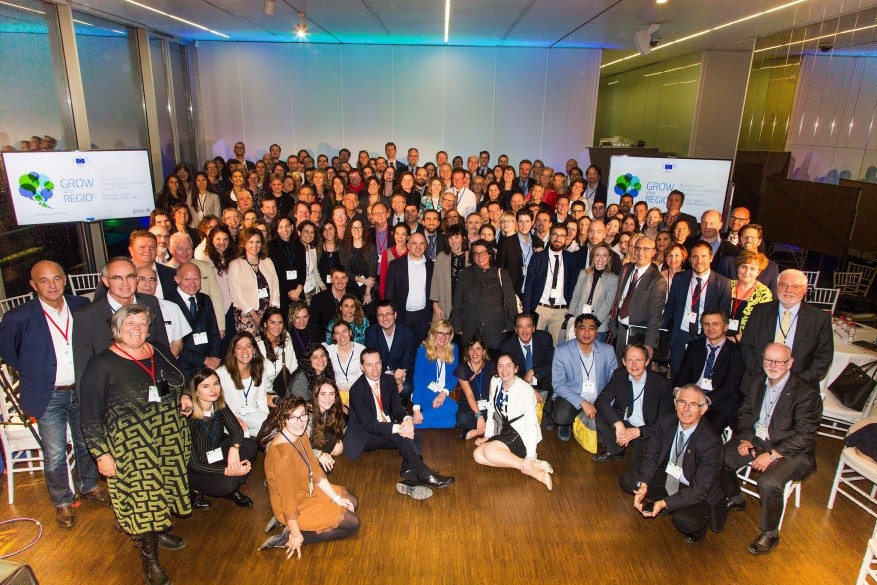Clusters as Drivers of Smart International Collaboration: European Experience
300 participants from 25 European countries took part in a joint effort to design the image of future clusters in the scope of the 2nd GROW your REGIOn conference in Valencia. Ekaterina Islankina, Researcher at the HSE ISSEK Russian Cluster Observatory, studied European experience and told the colleagues about Russian cluster initiatives, support programmes, and approaches to promoting smart specialisation in Russian regions.

The latest publications by the European Commission devoted to promotion of regional-level innovation and current EU industrial policy urge regions to step up their cooperation. Inter-regional focus was at the top of the agenda of the “GROW your REGIOn: Boosting smart interregional collaboration through clusters” conference held in Valencia on 8–9 November. The participants — representatives of the European Commission, regional authorities, development institutes, and cluster organisations — agreed that closer regional collaboration in Europe through clusters should become the main tool for promoting innovation, industry modernisation, and accelerating SME growth. The objectives of the major meeting which for 2 days brought together 300 people representing various sides of innovation systems in 25 countries were to share experience and best practices, disseminate information about existing political initiatives and support programmers, and foster new partnerships between European countries’ regional clusters.
Smart specialisation: promoting industrial modernisation and cluster cooperation
In recent years smart specialisation (as an approach to designing national and/or regional innovation development strategies) held a prominent position on the EU agenda. In 2011, an open Smart Specialisation Platform was established on the basis of the European Commission’s Joint Research Centre, to provide information, methodological, and expert support to national and regional authorities, facilitate mutual learning and inter-regional cooperation. One of the latest Platform-based innovations was the industrial modernisation block. This initiative is aimed at designing joint investment projects for industries identified in various countries’ and regions’ smart specialisation strategies. Inter-regional industrial modernisation partnerships comprising 60 regions and 11 subject areas are already established through the Smart Specialisation Platform, including innovations in the sports and textile industries, security, tourism, application of non-food biomass, new energy technologies, etc. Project design includes several stages:
- Identifying priority subject areas;
- Mapping available and lacking competencies in specific regions, and identifying opportunities for inter-regional cooperation;
- Designing actual investment projects aimed at advancing industrial value chains in Europe;
- Drafting three-year business plans for the investment projects, and submitting applications for funding.
A tender for establishing strategic European cluster partnerships to implement such projects was announced in 2017. The organisers believe involving clusters will help to more accurately define priority areas for industrial modernisation. The support budget amounts to 2.8 million euros; the plan for the first stage is to provide support to eight partnerships.
New initiatives to foster inter-regional cluster cooperation the European authorities are planning to launch before the end of 2017 also include another tender in the scope of the COSME programme, aimed at promoting collaboration of defence and security clusters, and joint development of dual-purpose technologies.
Management is the crucial factor
Implementing joint cluster projects, particularly those going beyond the borders of a single region, wouldn’t be possible without adequate management. All conference participants agreed that cluster organisations play a leading role here, and that investments should be made to promote cluster management as a profession. Here are a few examples to illustrate the relevance of this view:
- Bianca Dragomir, cluster manager of the year 2016, Spain: “AVAESEN electric energy cluster managed to survive the recent crisis thanks to efficient management and a new business model. We’ve become completely self-sufficient financially, by introducing membership fees and paid services for participants. On the other hand, we take responsibility for successful development of our member companies, in line with the principle “no saving, no reward”. We’ve developed individual growth plans for each member, with the focus on active internationalisation and participation in European grant programmes. Accordingly, in the last five years we’ve helped more than 100 small companies — cluster members to enter markets in 12 countries, foster 70 startup companies, and implement cluster members’ projects with the total funding received in the scope of the EU programmes in excess of 5 million euros”.
- Lukas Nögel, VDI/VDE innovation agency, Germany: “Following evaluation of German cluster support programmes, it was decided to extend the "Go clusters!" programme focused on the quality of cluster organisations’ management and meeting relevant international standards. Participation in the "Go cluster" programme is a pre-requisite for completing cluster certification procedure in line with the European Cluster Excellence Initiative (ECEI) methodology. The support format is to cover 50% of project costs (provided for a maximum of 9 months, up to 40 thousand euros per participant). Current priority areas for projects funded in the scope of the programme are bringing European regions’ value chains closer to each other, and developing relevant innovative services provided by cluster organisations”.
- Alain Tubiana, University of Strasbourg, France: “No one in Europe doubts that cluster management is a profession on its own right, which has to be specifically learned. It would be a grave error to believe that you can manage a cluster regardless of your background. Having realised that, we’ve launched the first in Europe Cluster Management Master’s programme in 2013. It’s taught in three languages, English, French, and German (European cluster managers work in multilanguage environments). We also offer upgrading cluster management courses jointly with The Cluster4smart Project, Erasmus+”.
Russian clusters in 15 minutes
One of the conference activities was 15-minute participant meetings to discuss opportunities for cluster collaboration. Information about existing cluster initiatives and support programmes was shared with colleagues from Germany, France, Spain, Slovakia, Portugal, and Lithuania. Ekaterina Islankina, Researcher at the Russian Cluster Observatory spoke about the current Russian cluster landscape, and approaches to fostering smart specialisation in Russian regions.
